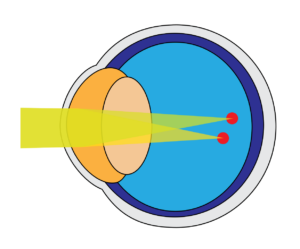
Foods to Avoid in the Hunt for Healthier Eyes
If you’re a consistent reader of Rebuild Your Vision, you know some key facts about what foods help keep your eyes healthy. Green, leafy vegetables can help protect your eyes from excess UV light, omega-3 acids help stimulate tear production, and so on. Unfortunately, that particular knife cuts both ways. A healthy diet can do wonders for your eyes, but an unhealthy one can leave you with more problems than you started with. Just like there are foods to avoid to keep a trim waistline, there are also foods to avoid when it comes to preserving your eyes.
While there are very few cases of individual foods being tied to definite eye problems, there are absolutely certain habits or trends in a diet that are best to cut out. Keep reading to discover how your weekly menu might be impacting your vision.
Fats and Sugars
We’ll start with some advice that you could probably find in just about any health column. Avoid sugary beverages and saturated fats. The reason? A sugar and fat-rich diet contributes heavily to your odds of contracting Type II Diabetes, probably the single greatest diet-linked threat to your eyesight. Diabetics contend with several possible eye disorders. Diabetic retinopathy is the most common.
 Diabetic retinopathy likely develops as a result of consistently high blood glucose levels, a common problem among diabetics. Prolonged exposure to high glucose, paired with the high blood pressure that also comes often comes with diabetes, can damage the tiny blood vessels found in the back of the eye. Over time, these vessels weaken, swell, and break.
Diabetic retinopathy likely develops as a result of consistently high blood glucose levels, a common problem among diabetics. Prolonged exposure to high glucose, paired with the high blood pressure that also comes often comes with diabetes, can damage the tiny blood vessels found in the back of the eye. Over time, these vessels weaken, swell, and break.
If the problem continues, new, abnormal vessels will grow and behave similarly. Blood leaking into the eye from these damaged vessels can occlude vision. Not only that, if the condition persists, scar tissue can form, contract, and begin to peel the retina from the back of the eye.
Glaucoma
Glaucoma is another disorder that diabetics are particularly prone to. The damage to blood vessels that eventually causes retinopathy can also interfere with normal blood flow to and from an eye. These complications can eventually result in an unhealthy increase of pressure inside the eye. This can in turn cause nerve damage if left untreated. Cataracts, or low vision occurring after cloudy deposits form on the eye, are also a diabetic hallmark.
Avoiding diabetes is one of the best things you can do for your eyes’ health. Unfortunately, that isn’t always possible – type II has a complex set of interacting causes, not all of which are lifestyle-related. However, by hewing to a healthy diet, you’ll be putting yourself in a good position to stay diabetes-free in the future.
Sugary Drinks
One of the best ways to do that is to ditch the soft drinks. Sugary drinks, including soda, vitamin water, sports drinks, and sugar-packed juices, are freely available in the US. Despite their prominence, they can do your health several ill turns. Research has strongly linked heavy consumption of sugary beverages to diabetes, and people already suffering from diabetes are advised to give them a miss too – one bottle may contain hundreds of calories, and can easily throw blood-sugar levels into unhealthy ranges.
Even if you’re not concerned with diabetes, sugary drinks can still pose problems. The spike in blood sugar that they cause also affects nondiabetic eyes. People suffering from age-related macular degeneration (AMD), which can affect small blood vessels in the eye, may have some of the same reasons to avoid sugary beverages that diabetic retinopathy patients do.
Eating fewer animal fats might also help. Yep, it’s never easy to forgo a burger, but it’s almost always a good dietary choice. Studies have found that replacing the saturated fats found in processed foods and red meats with the unsaturated fats found in seafood and vegetable oils can help reduce insulin sensitivity. Insulin sensitivity is a key factor in developing diabetes.
Refined Carbs
Even if AMD patients manage to cut down on sugary drinks, their diets can still bite back. A high intake of carbohydrates, caused by eating large amounts of rice, bread, pasta, or similar foods, can affect eyes in much the same way that sugar excesses do. This is most applicable to refined carbs, such as white rice or white bread.
These foods in particular are very readily broken down into sugar, which is in turn absorbed into the blood. Eat too much of it and you again risk spiking blood glucose levels. Of course, this leads to damaging blood vessels in the eye. Stick to less processed carbs for a safer option. Selecting brown rice or even a different grain such as quinoa over white rice can make a major difference in some diets.
Caffeine
Many of us claim to survive based on our caffeine intake. But could this stimulant have a negative effect on your vision? Relax, you don’t have to put the coffee down – probably. Still, consistent consumption of coffee may have ill effects on your eyes. Some studies have pointed to a link between caffeine and a condition known as pseudoexfoliation syndrome (PEX), or exfoliation glaucoma. PEX occurs when tiny protein fibers build up in the eye, where they can eventually grow enough to impair proper drainage of fluid in the eye. When this happens, the result is an increase of pressure within the eye, or glaucoma, which can, over time, damage the optic nerve.
However, it turns out that caffeine can also have some benefits for your vision. New studies link caffeine and preventing oxygen induced retinopathy. Oxygen induced retinopathy is the leading cause of child blindness, but it can affect adults, too. So, perhaps the best advice we can give you is to enjoy that cup of morning joe – in moderation.
That advice goes for all these foods listed – tone it down. Eating the right foods, and better yet, avoiding the bad foods, can really make a difference in the long-term health of your eyes and vision. So, eating healthy can do more than just keeping your body looking good – it will help keep your vision healthy for life, too.
Our Rebuild Your Vision Ocu-Plus Formula Contains All 17 Vitamins, Minerals, and Herbal Supplements to Improve Your Eye Health!












I have periferral vission issues from a traumatic brain injury and following stroke. I have trouble with perifferal vission, “seeing above the horizon”! So you have any suggestions for me. I am already receiving neueoBiofeedback to assist with treatment. Do you have any other recovery suggestions?
Thanks Tyler, all good advice and all is supported by current studies except for high fat diets. Current studies are showing that high fat diets are actually good for us. Saturated fats from natural sources such as pastured meats, eggs from free range hens, avocados, coconut oil, etc. do not cause high cholesterol as we’ve been told. Instead they provide healthy fats and cholesterol that our body & brain require. The brain is made up of fats and cholesterol, mainly saturated fat. A diet low in saturated fats deprives the brain of the building blocks it needs for proper repair and function. Saturated fats also play a critical role in the function of a healthy immune system, our lungs, liver and in the building of strong bones, These studies and articles are easy to find. The fats to avoid are trans fats and fats containing oxygenated cholesterol such as pasteurized & homogenized milk products. These processes change the natural fats & cholesterol in milk such that our body is not able to utilize them properly such that become damaging to our health.
Speaking of milk, milk has many issues but one I’ve seen lately that pertains to eyesight is the sugar protein in milk, lactose. Lactose is broken down by lactase into glucose and galactose. It seems many of us have low quantities of the galactose-metabolizing enzymes needed to break this sugar protein down. Thus galactose builds up in the body causing many issues one of which is cateracts. There’s even a Wikipedia entry on that a called, Galactosemic cataract (http://en.wikipedia.org/wiki/Galactosemic_cataract). Granted this condition concerns individuals that are devoid of this enzyme thus the galactose builds up quickly but the discussions I’m hearing are that incomplete breakdown of this protein still causes it to build up, just at a slower rate.
Thanks again for all you do . . .
Thank you. I’m all about living and eating more healthily. In many ways it comes down to wise choices and a balanced life-style for me. Seeing more clearly goes hand-in-hand with improved self-awareness and understanding, self-fulfillment and defining what’s really important. Thank you for the tips / explanations.